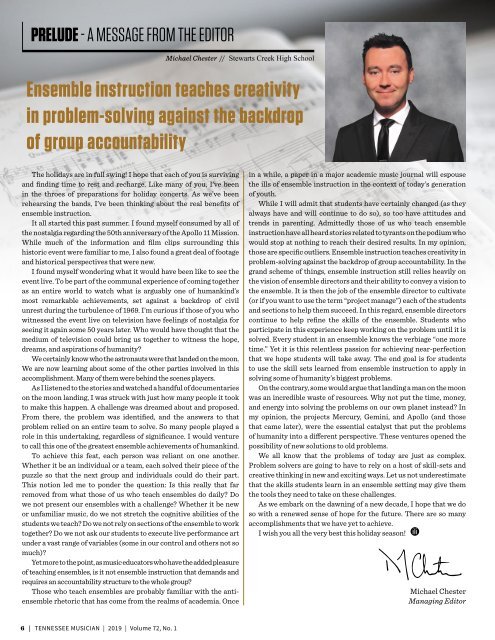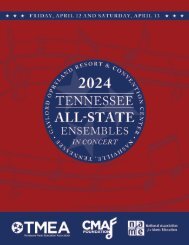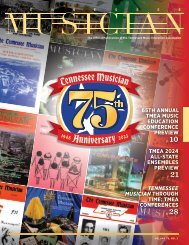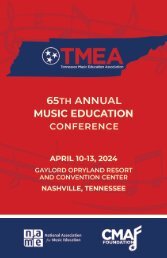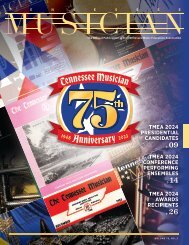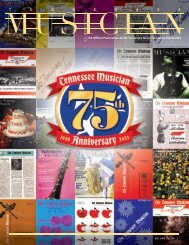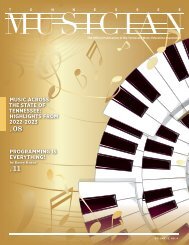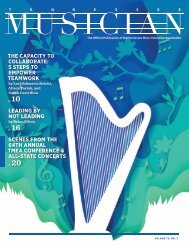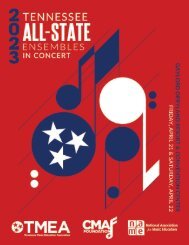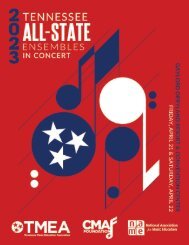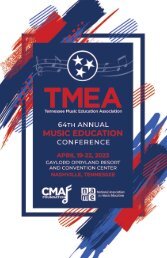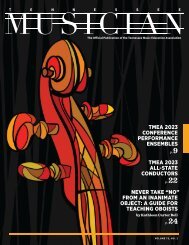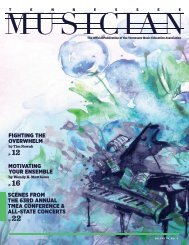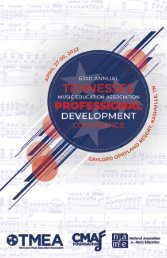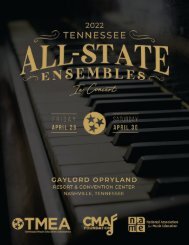You also want an ePaper? Increase the reach of your titles
YUMPU automatically turns print PDFs into web optimized ePapers that Google loves.
PRELUDE - A MESSAGE FROM THE EDITOR<br />
Michael Chester // Stewarts Creek High School<br />
Ensemble instruction teaches creativity<br />
in problem-solving against the backdrop<br />
of group accountability<br />
The holidays are in full swing! I hope that each of you is surviving<br />
and finding time to rest and recharge. Like many of you, I’ve been<br />
in the throes of preparations for holiday concerts. As we’ve been<br />
rehearsing the bands, I’ve been thinking about the real benefits of<br />
ensemble instruction.<br />
It all started this past summer. I found myself consumed by all of<br />
the nostalgia regarding the 50th anniversary of the Apollo 11 Mission.<br />
While much of the information and film clips surrounding this<br />
historic event were familiar to me, I also found a great deal of footage<br />
and historical perspectives that were new.<br />
I found myself wondering what it would have been like to see the<br />
event live. To be part of the communal experience of coming together<br />
as an entire world to watch what is arguably one of humankind’s<br />
most remarkable achievements, set against a backdrop of civil<br />
unrest during the turbulence of 1969. I’m curious if those of you who<br />
witnessed the event live on television have feelings of nostalgia for<br />
seeing it again some 50 years later. Who would have thought that the<br />
medium of television could bring us together to witness the hope,<br />
dreams, and aspirations of humanity?<br />
We certainly know who the astronauts were that landed on the moon.<br />
We are now learning about some of the other parties involved in this<br />
accomplishment. Many of them were behind the scenes players.<br />
As I listened to the stories and watched a handful of documentaries<br />
on the moon landing, I was struck with just how many people it took<br />
to make this happen. A challenge was dreamed about and proposed.<br />
From there, the problem was identified, and the answers to that<br />
problem relied on an entire team to solve. So many people played a<br />
role in this undertaking, regardless of significance. I would venture<br />
to call this one of the greatest ensemble achievements of humankind.<br />
To achieve this feat, each person was reliant on one another.<br />
Whether it be an individual or a team, each solved their piece of the<br />
puzzle so that the next group and individuals could do their part.<br />
This notion led me to ponder the question: Is this really that far<br />
removed from what those of us who teach ensembles do daily? Do<br />
we not present our ensembles with a challenge? Whether it be new<br />
or unfamiliar music, do we not stretch the cognitive abilities of the<br />
students we teach? Do we not rely on sections of the ensemble to work<br />
together? Do we not ask our students to execute live performance art<br />
under a vast range of variables (some in our control and others not so<br />
much)?<br />
Yet more to the point, as music educators who have the added pleasure<br />
of teaching ensembles, is it not ensemble instruction that demands and<br />
requires an accountability structure to the whole group?<br />
Those who teach ensembles are probably familiar with the antiensemble<br />
rhetoric that has come from the realms of academia. Once<br />
in a while, a paper in a major academic music journal will espouse<br />
the ills of ensemble instruction in the context of today’s generation<br />
of youth.<br />
While I will admit that students have certainly changed (as they<br />
always have and will continue to do so), so too have attitudes and<br />
trends in parenting. Admittedly those of us who teach ensemble<br />
instruction have all heard stories related to tyrants on the podium who<br />
would stop at nothing to reach their desired results. In my opinion,<br />
those are specific outliers. Ensemble instruction teaches creativity in<br />
problem-solving against the backdrop of group accountability. In the<br />
grand scheme of things, ensemble instruction still relies heavily on<br />
the vision of ensemble directors and their ability to convey a vision to<br />
the ensemble. It is then the job of the ensemble director to cultivate<br />
(or if you want to use the term “project manage”) each of the students<br />
and sections to help them succeed. In this regard, ensemble directors<br />
continue to help refine the skills of the ensemble. Students who<br />
participate in this experience keep working on the problem until it is<br />
solved. Every student in an ensemble knows the verbiage “one more<br />
time.” Yet it is this relentless passion for achieving near-perfection<br />
that we hope students will take away. The end goal is for students<br />
to use the skill sets learned from ensemble instruction to apply in<br />
solving some of humanity’s biggest problems.<br />
On the contrary, some would argue that landing a man on the moon<br />
was an incredible waste of resources. Why not put the time, money,<br />
and energy into solving the problems on our own planet instead? In<br />
my opinion, the projects Mercury, Gemini, and Apollo (and those<br />
that came later), were the essential catalyst that put the problems<br />
of humanity into a different perspective. These ventures opened the<br />
possibility of new solutions to old problems.<br />
We all know that the problems of today are just as complex.<br />
Problem solvers are going to have to rely on a host of skill-sets and<br />
creative thinking in new and exciting ways. Let us not underestimate<br />
that the skills students learn in an ensemble setting may give them<br />
the tools they need to take on these challenges.<br />
As we embark on the dawning of a new decade, I hope that we do<br />
so with a renewed sense of hope for the future. There are so many<br />
accomplishments that we have yet to achieve.<br />
I wish you all the very best this holiday season!<br />
Michael Chester<br />
Managing Editor<br />
6 | TENNESSEE MUSICIAN | 2019 | <strong>Vol</strong>ume <strong>72</strong>, <strong>No</strong>. 1


